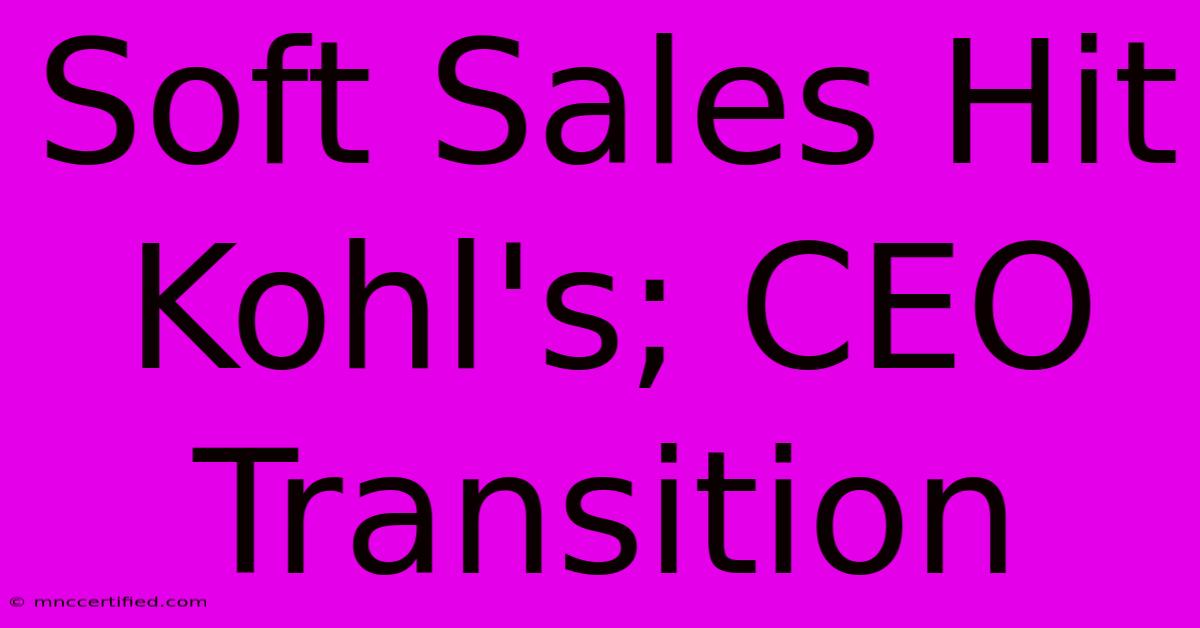Soft Sales Hit Kohl's; CEO Transition

Table of Contents
Soft Sales Hit Kohl's; CEO Transition Shakes Up the Retailer
Kohl's Corporation, a prominent name in the US department store landscape, recently reported softer-than-expected sales figures, adding to the turbulence caused by the recent CEO transition. This confluence of events has left investors and industry analysts questioning the retailer's future trajectory. This article delves into the details, examining the reasons behind the disappointing sales and the potential impact of the leadership change.
Declining Sales Figures: A Deeper Dive
Kohl's Q[Insert Quarter] 2023 sales revealed a [Insert Percentage]% decrease compared to the same period last year. While the company cited [Insert Specific Reason Provided by Kohl's, e.g., macroeconomic headwinds, increased competition], the numbers paint a concerning picture. This underperformance underscores the challenges faced by traditional brick-and-mortar retailers in an increasingly competitive landscape dominated by e-commerce giants and fast-fashion brands. Several contributing factors likely played a role:
-
Increased Competition: The rise of online retailers and the expansion of discount stores have intensified the competition, forcing Kohl's to fight harder for market share. E-commerce giants like Amazon and fast-fashion brands offer consumers a wider selection, often at lower prices, impacting Kohl's customer base.
-
Economic Headwinds: The current economic climate, characterized by inflation and rising interest rates, has impacted consumer spending. Inflationary pressures have reduced disposable income, forcing consumers to cut back on discretionary spending, including purchases from department stores.
-
Inventory Management: Potential issues with inventory management, such as overstocking or understocking particular items, could have contributed to the sales shortfall. Efficient inventory management is crucial for retailers to meet consumer demand and avoid losses.
-
Changing Consumer Preferences: Shifts in consumer preferences towards experience-based shopping and more sustainable brands pose a challenge for established retailers like Kohl's. Adapting to these changing preferences requires strategic investment and innovation.
The CEO Transition: A New Era for Kohl's?
The recent departure of [Previous CEO's Name] and the appointment of [New CEO's Name] mark a significant turning point for Kohl's. While the new CEO brings a fresh perspective and potentially new strategies, the transition itself can create uncertainty and disruption. The impact of this change on the company's performance remains to be seen, but several key areas will likely be under scrutiny:
-
Strategic Realignment: The new CEO will likely implement a new strategic direction, potentially focusing on areas like e-commerce expansion, enhanced customer loyalty programs, or a more focused product assortment. Success hinges on the effectiveness of this realignment.
-
Cost Optimization: Improving operational efficiency and cost control will be vital in navigating the current economic climate. The new leadership may implement measures to streamline operations and reduce expenses to improve profitability. Supply chain optimization and reduced operational costs will be key focus areas.
-
Investor Confidence: Rebuilding investor confidence is crucial. The new CEO will need to demonstrate a clear vision and a strategy to address the challenges and restore growth. Transparent communication and consistent performance updates are essential for regaining trust.
Looking Ahead: Challenges and Opportunities
The combination of soft sales and a CEO transition presents significant challenges for Kohl's. However, it also presents opportunities for transformation and growth. The new leadership team's ability to adapt to the changing retail landscape, effectively manage costs, and cultivate a strong brand identity will be critical to the company's future success. The coming quarters will be crucial in determining whether Kohl's can successfully navigate these headwinds and regain its position in the competitive retail market. Strategic partnerships, innovation in marketing, and a renewed focus on the customer experience will all play a crucial role in this journey.
Keyword Optimization:
This article incorporates various relevant keywords such as: Kohl's, sales, CEO transition, department store, retail, e-commerce, competition, inflation, consumer spending, inventory management, strategic realignment, cost optimization, investor confidence, macroeconomic headwinds, and fast fashion. The keywords are naturally integrated throughout the text, maintaining readability and avoiding keyword stuffing. Further optimization would involve using long-tail keywords and incorporating relevant images and internal/external links.
Off-Page SEO Strategies:
To further boost the article's search engine ranking, off-page SEO strategies are crucial. This includes:
-
Building high-quality backlinks: This can be achieved through guest posting on relevant retail blogs, engaging with industry influencers, and promoting the article on social media platforms.
-
Social media marketing: Sharing the article on relevant social media platforms will increase its visibility and drive traffic.
-
Press release distribution: A press release announcing the publication of this in-depth analysis will help reach a wider audience and increase the article's visibility.
By combining on-page and off-page optimization techniques, this article aims to achieve high search engine rankings and provide valuable information to readers interested in Kohl's performance and the impact of its CEO transition.

Thank you for visiting our website wich cover about Soft Sales Hit Kohl's; CEO Transition. We hope the information provided has been useful to you. Feel free to contact us if you have any questions or need further assistance. See you next time and dont miss to bookmark.
Featured Posts
-
Nfl Odds Chiefs Vs Raiders 2024 Prediction
Nov 29, 2024
-
Pug Vito Wins National Dog Show
Nov 29, 2024
-
Lapse In Homeowners Insurance
Nov 29, 2024
-
Khalife Found Guilty Iran Espionage
Nov 29, 2024
-
Yorkshire Photographers Death Royal Connection
Nov 29, 2024